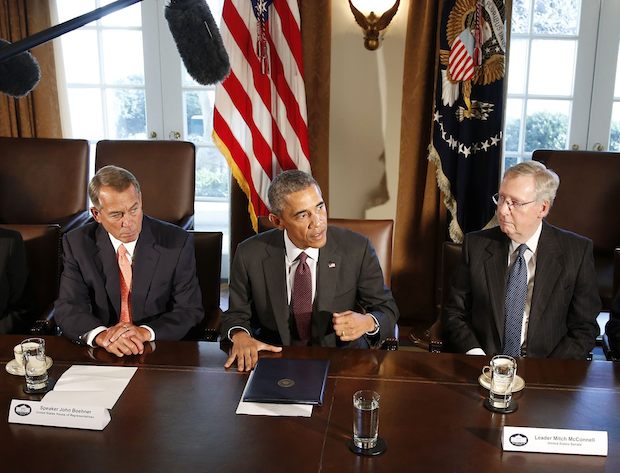Will Congress Give Obama the War He Wants?

A rare point of agreement between President Obama and congressional Republicans: legally authorizing the war against the Islamic State.
The president had previously indicated that he thinks authorization is unnecessary. But he will deign to go to Congress if they are willing to pass his preferred language for a resolution authorizing the use of force.
For once, Republican leaders seem happy to be Obama’s rubber stamp. Senate Majority Leader Mitch McConnell emerged from an otherwise unproductive White House meeting saying an Obama-generated authorization of force was coming real soon.
“I think a good starting place is for him to tell us what he wants, and to provide the initial document off which we would work,” McConnell said. “And my feeling is that we’re just going to get that some time in the near future.”
“He was sending one up,” Senate Majority White John Cornyn concurred.
“Historically the Commander-in-Chief has identified the need for use of military force, written the AUMF, sent it to Capitol Hill, and worked to build a bipartisan coalition to secure its passage,” House Speaker John Boehner’s office told Politico. “If the President takes these steps, Republicans will work with him to build bipartisan support for its enactment.”
Arizona Republican Sen. John McCain took the same position on the resolution’s authorization.
Obama wishes they would be so accommodating on immigration policy, since he’s said he wouldn’t have to take executive action if Congress would just pass the amnesty he wants. And that’s been the big problem with an authorization of force from the White House’s perspective: many of the resolutions being drafted in Congress seek to limit the scope of our involvement.
This includes the resolution backed by liberal hawk Sen. Robert Menendez when he chaired the Senate Foreign Relations Committee. It would have effectively banned offensive combat operations.
Kentucky Republican Sen. Rand Paul’s version not only prohibits ground troops but also repeals the existing Iraq war authorization and sunsets both the post-9/11 authorization of force and itself after a year. Naturally, that’s not what the Obama administration wants.
But there are exceptions. Before retiring from Congress, Virginia Republican Rep. Frank Wolf floated a resolution that would have allowed the president to go to war indefinitely against a laundry list of terrorist groups not confined to ISIS.
Even if a restrictive resolution passes, lawmakers should be clear-eyed about how easy it will be for the president to slip Congress’s leash. Once at war, the president has great latitude to direct day-to-day operations. Congress’s options for constraining him are limited and, like the oft-referenced “power of the purse,” politically unpalatable. There should be concerns beyond the language, assuming it even makes sense to wage war against ISIS at this stage.
That’s why hawks always talk up Congress’s ability to cut off funding for a war it opposes. They know it will be difficult, if not impossible, to secure the votes to defund a war once the troops are already in theater.
Congress is just as eager to punt issues of war and peace to the president. Remember how many Democrats, including then-Sen. Hillary Clinton, framed their votes for the Iraq war as a backstop in case diplomacy failed? In her speech before the Senate vote, Clinton all but denied she was casting an affirmative vote for the war as anything other than a last resort.
But it was always clear that George W. Bush planned to go to war and the resolution Congress passed gave him the power to do so. The Democrats had already declined more restrictive alternatives, especially after then House Democratic Leader Richard Gephardt supported the president.
This history isn’t just relevant to the ISIS debate. There are also some members of Congress who pretend passing an authorization of force for Iran will expedite diplomacy rather than lead to war. South Carolina Republican Sen. Lindsey Graham has suggested it would be helpful for the president to have war approval “in his back pocket if negotiations get serious.”
Sounds logical.
Former Georgia Republican Rep. Jack Kingston once summed up many legislators’ views on congressional war powers. “A lot of people would like to stay on the sideline and say, ‘Just bomb the place and tell us about it later,'” he said. “It’s an election year. A lot of Democrats don’t know how it would play in their party, and Republicans don’t want to change anything. We like the path we’re on now. We can denounce it if it goes bad, and praise it if it goes well and ask what took him so long.”
A congressional vote wouldn’t necessarily make our ISIS policy wise. But it would at least make it legal.
W. James Antle III is managing editor of the Daily Caller and author of Devouring Freedom: Can Big Government Ever Be Stopped?
Comments